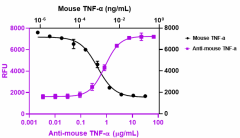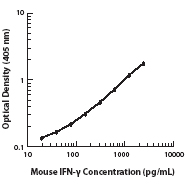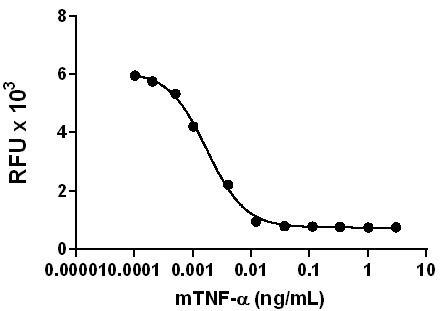- Clone
- QA19A26 (See other available formats)
- Regulatory Status
- RUO
- Other Names
- Tumor necrosis factor-α, Cachectin, Necrosin, Macrophage cytotoxic factor (MCF), Differentiation inducing factor (DIF), TNFSF2
- Isotype
- Mouse IgG1, κ
- Ave. Rating
- Submit a Review
- Product Citations
- publications

-

Recombinant mouse TNF-α (Cat. No. 575206) (black circles) cytotoxicity of 929L mouse musculus cells. Ultra-LEAF™ purified anti-mouse TNF-α antibody (clone QA19A26) (purple squares) neutralizes the cytotoxicity function of recombinant mouse TNF-α at 0.03 ng/mL in 929L cells in a dose-dependent manner. ND50 range: 0.5-2.5 μg/mL.
| Cat # | Size | Price | Quantity Check Availability | Save | ||
|---|---|---|---|---|---|---|
| 935903 | 100 µg | 216€ | ||||
| 935904 | 1 mg | 572€ | ||||
TNF-α is secreted by macrophages, monocytes, neutrophils, T-cells, and NK-cells. Many transformed cell lines also secrete TNF-α. TNF-α forms multimeric complexes; stable trimers are most common in solution. A 26 kD membrane form of TNF-α has also been described. TNF-α binding to surface receptors elicits a wide array of biologic activities including: cytolysis and cytostasis of many tumor cell lines in vitro, hemorraghic necrosis of tumors in vivo, increased fibroblast proliferation, and enhanced chemotaxis and phagocytosis in neutrophils.
Product DetailsProduct Details
- Verified Reactivity
- Mouse
- Antibody Type
- Recombinant
- Host Species
- Mouse
- Immunogen
- Recombinant Mouse TNF-α
- Formulation
- 0.2 µm filtered in phosphate-buffered solution, pH 7.2, containing no preservative.
- Endotoxin Level
- Less than 0.01 EU/µg of the protein (< 0.001 ng/µg of the protein) as determined by the LAL test.
- Concentration
- The antibody is bottled at the concentration indicated on the vial, typically between 2 mg/mL and 3 mg/mL. Older lots may have also been bottled at 1 mg/mL. To obtain lot-specific concentration and expiration, please enter the lot number in our Certificate of Analysis online tool.
- Storage & Handling
- The antibody solution should be stored undiluted between 2°C and 8°C. This Ultra-LEAF™ solution contains no preservative; handle under aseptic conditions.
- Application
-
Neut - Quality tested
- Recommended Usage
-
Each lot of this antibody is quality control tested by neutralization of the cytotoxicity by recombinant mouse TNF- α (0.03 ng/mL) on 929L mouse musculus cells. ND50 range: 0.5 - 2.5 µg/mL. It is recommended that the reagent be titrated for optimal performance for each application.
- Application Notes
-
This recombinant antibody clone is derived from clone MP6-XT22.
- RRID
-
AB_2890855 (BioLegend Cat. No. 935903)
AB_2890855 (BioLegend Cat. No. 935904)
Antigen Details
- Structure
- TNF superfamily; dimer/trimer
- Distribution
-
Activated monocytes, neutrophils, macrophages, T cells, B cells, NK cells, LAK cells
- Function
- Type II integral membrane protein processed by TACE for secretion; upregulated by interferons, IL-2, GM-CSF, substance P, bradykinin, PAF, immune complexes, cyclooxygenase; downregulated by IL-6, TGF-β, vitamin D3, prostaglandin E2, PAF antagonists
- Interaction
- Monocytes, neutrophils, macrophages, T cells, fibroblasts, endothelial cells, osteoclasts, adipocytes, astroglia, microglia
- Ligand/Receptor
- TNFRSF1A (TNF-R1, CD120a, TNFR-p60 Type β, p55); TNFRSF1B (TNF-R2, CD120b, TNFR-p80 Type A, p75)
- Cell Type
- B cells, Endothelial cells, Fibroblasts, Macrophages, Microglia, Monocytes, Neutrophils, NK cells, Osteoclasts, T cells
- Biology Area
- Cell Biology, Immunology, Neuroinflammation, Neuroscience
- Molecular Family
- Cytokines/Chemokines
- Antigen References
-
1. Fitzgerald K, et al. Eds. 2001. The Cytokine FactsBook. Academic Press San Diego.
2. Beutler B, et al. 1988. Annu. Rev. Biochem. 57:505.
3. Beutler B, et al. 1989. Annu. Rev. Immunol. 7:625.
4. Tracey K, et al. 1993. Crit. Care Med. 21:S415. - Gene ID
- 21926 View all products for this Gene ID
- UniProt
- View information about TNF-alpha on UniProt.org
Related FAQs
- Do you guarantee that your antibodies are totally pathogen free?
-
BioLegend does not test for pathogens in-house aside from the GoInVivo™ product line. However, upon request, this can be tested on a custom basis with an outside, independent laboratory.
- Does BioLegend test each Ultra-LEAF™ antibody by functional assay?
-
No, BioLegend does not test Ultra-LEAF™ antibodies by functional assays unless otherwise indicated. Due to the possible complexities and variations of uses of biofunctional antibodies in different assays and because of the large product portfolio, BioLegend does not currently perform functional assays as a routine QC for the antibodies. However, we do provide references in which the antibodies were used for functional assays and we do perform QC to verify the specificity and quality of the antibody based on our strict specification criteria.
- Does BioLegend test each Ultra-LEAF™ antibody for potential pathogens?
-
No, BioLegend does not test for pathogens in-house unless otherwise indicated. However, we can recommend an outside vendor to perform this testing as needed.
- Have you tested this Ultra-LEAF™ antibody for in vivo or in vitro applications?
-
We don't test our antibodies for in vivo or in vitro applications unless otherwise indicated. Depending on the product, the TDS may describe literature supporting usage of a particular product for bioassay. It may be best to further consult the literature to find clone specific information.
Other Formats
View All TNF-α Reagents Request Custom Conjugation| Description | Clone | Applications |
|---|---|---|
| Ultra-LEAF™ Purified anti-mouse TNF-α Recombinant Antibody | QA19A26 | Neut |
Customers Also Purchased
Compare Data Across All Formats
This data display is provided for general comparisons between formats.
Your actual data may vary due to variations in samples, target cells, instruments and their settings, staining conditions, and other factors.
If you need assistance with selecting the best format contact our expert technical support team.
-
Ultra-LEAF™ Purified anti-mouse TNF-α Recombinant Antibody

Recombinant mouse TNF-α (Cat. No. 575206) (black circles) cy...
 Login / Register
Login / Register 












Follow Us